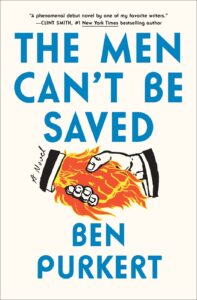
[Overlook Press; 2023]
Overly impressed by his own excellence and convinced he can do no wrong, Seth suffers from all the self-aggrandizing trappings of machismo. And so his spiraling decline becomes a comically tragic portrayal of self delusion and personal failure. Ben Purkert’s extremely funny debut, The Men Can’t Be Saved, is both a state-of-the-nation novel and a comedy of manners. Seth’s farcical adventure features a sprawling cast of twenty-first-century complexities: modern masculinity, faith, advertising, addiction, and the art of making good coffee.
Seth is a copywriter at a New York ad agency called Razorbeat, and his tagline for a male incontinence brand—”Everyday Briefs for the Everyday Hero”—has won him an award. His “clingy” fellow writers admire his ability to “maintain one’s swagger” in pitches. It’s only a matter of time, Seth reasons, before he makes partner at the firm. After all, Diego, one of the partners, has an “apprentice’s disposition,”—Seth will unseat him soon enough. The hero’s latest assignment is with a prostate cancer charity, and the pitch is led by a partner he has yet to meet. But according to Josie—whom he regularly meets for late night trysts in Diego’s office—Robert Moon is the embodiment of masculine bravado. “He’s even worse than you,” she tells Seth.
Seth’s initial meeting with Moon triggers a sequence of disastrous events that reveal the hero to be more hapless than accomplished. Of course, Seth doesn’t perceive himself in this way. When the prostate cancer pitch with Moon goes badly wrong and Razorbeat starts layoffs, Seth declines their offer to employ him as a lowly freelancer and wonders how Josie will cope in his absence. Indeed, he wonders: “How would the agency survive without me?” Seth winds up working as a barista in a Swedish chocolate and coffee store out of “fiscal necessity,” but convinces himself this is only a temporary blip. He falls for Ramya, a young art student and fellow barista, but this, too, is only intended to be a transient coupling. “I’d bid her farewell and, like a loyal patriot called to duty, return to the front,” the world of copywriting. In reality, Seth becomes hooked on Ramya and her supply of pills. And when Robert Moon turns up as a customer, Seth knots himself in a tangle of lies and deceit to preserve his image.
Rather than taking pleasure in Seth’s dismal attempts to impress Moon, Purkert raises the suspicion that beneath Seth’s supercilious persona is an insecurity. Seth becomes the subject of our pity rather than mockery. After all, without his deluded assertions, Seth would have to admit he is totally lost. And Purkert makes good comedy out of Seth’s determined, increasingly absurd efforts to avoid admitting this. As each of Seth’s failings, his narcissism, chauvinism, self-assuredness, are gradually eroded by his circumstances, exposing a fragile vulnerability, readers may even find themselves sympathetic to him. When Seth can’t remember how to operate the till while serving Moon, he pays for the expensive chocolates himself. Reading this, I realized I was no longer taking pleasure in Seth’s failures, but groaning with pity.
What begins as a novel satirizing the male ego and capitalism’s ultimate hero—the ad man—quickly becomes a treatise on identity. Part of Seth’s identity comes from him being Jewish, and early on he decides to use up his holiday days by taking a subsidized trip to Israel thanks to the Birthright scheme. He is going for a free holiday, rather than to discover his Jewish heritage, something he has been acutely aware of all his life. “I never needed to try to be Jewish; I just was.” He doesn’t feel any need for religion. He gets somebody else to travel to the wailing wall with his mother’s copy of the kaddish prayer because it’s too hot and too far to walk. Yet, a few months later, on a doomed mission to find Ramya, he finds himself visiting a Chabad house—an outreach group operated by orthodox, Hasidic Jews. Drawn to the Rabbi and his family, Seth inveigles himself into their home with a lie about a sick Jewish girlfriend. While knocking back booze and pills in their basement, he also begins to read the Talmud and listens when the Rabbi says Jewishness is “a Jew with no faith.” Seth thinks about this. “I visualised a person with a gaping hole in the middle. Basically, a bagel.” An amusing and entirely accurate summation of Purkert’s hero. Through Seth’s fraught and madcap travails, the hole only gets bigger. He is a man searching for a center, and it’s hard not to see through him.
“The Men Can’t Be Saved” could be one of Seth’s taglines. Neither he, Robert Moon, nor the Rabbi, are able to save their dissolute, narcissistic selves. Just like the professions of advertising and commerce, perhaps even preaching, these men distort reality, create false versions of themselves to convince an audience they are functioning successfully. One of Seth’s taglines that failed to impress the prostate cancer charity—an organization literally attempting to save men—was “Treatment is Everything.” And Purkert’s smart treatment of his material elevates this novel. Although too steeped in farce and comedy to be considered a work of realism, this novel reflects on the temporaneous nature of work and relationships, the effects of substance abuse, family relationships, and finding personal happiness as a backdrop for uproarious, Wodehousian plotting. Purkert creates a world and sells it to us—not for profit, but to reveal the truth about how hard life can be.
With The Men Can’t Be Saved, Ben Purkert joins the ranks of Sam Lipsyte and Joshua Cohen as a master of the confused male protagonist, the man struggling to see how he fits into the contemporary world. In 2020, discussing his poetry collection For the Love of Endings on the New Yorker poetry podcast, Purkert said, “I’m drawn to poets who invite humour into their poems while, of course, still being deadly serious.” In The Men Can’t Be Saved, Purkert, like an enthusiastic party thrower, doesn’t so much invite humor in as flings open the door and insists on entry. And yet, it’s a novel that is also, deadly serious. Seth may be a fool, but he is also a product of the culture, a victim of all the taglines and slogans he writes. We shouldn’t feel sorry for Seth—he will be fine. It’s the world around us that should concern us because, until it changes, Purkert is right: The men can’t be saved.
Simon Lowe is a British writer. His stories have appeared in EX/Post, Breakwater Review, AMP, Akashic Books online, Ponder Review, and elsewhere. His novel, The World is at War, Again, was published June 2021 (Elsewhen Press).
This post may contain affiliate links.







